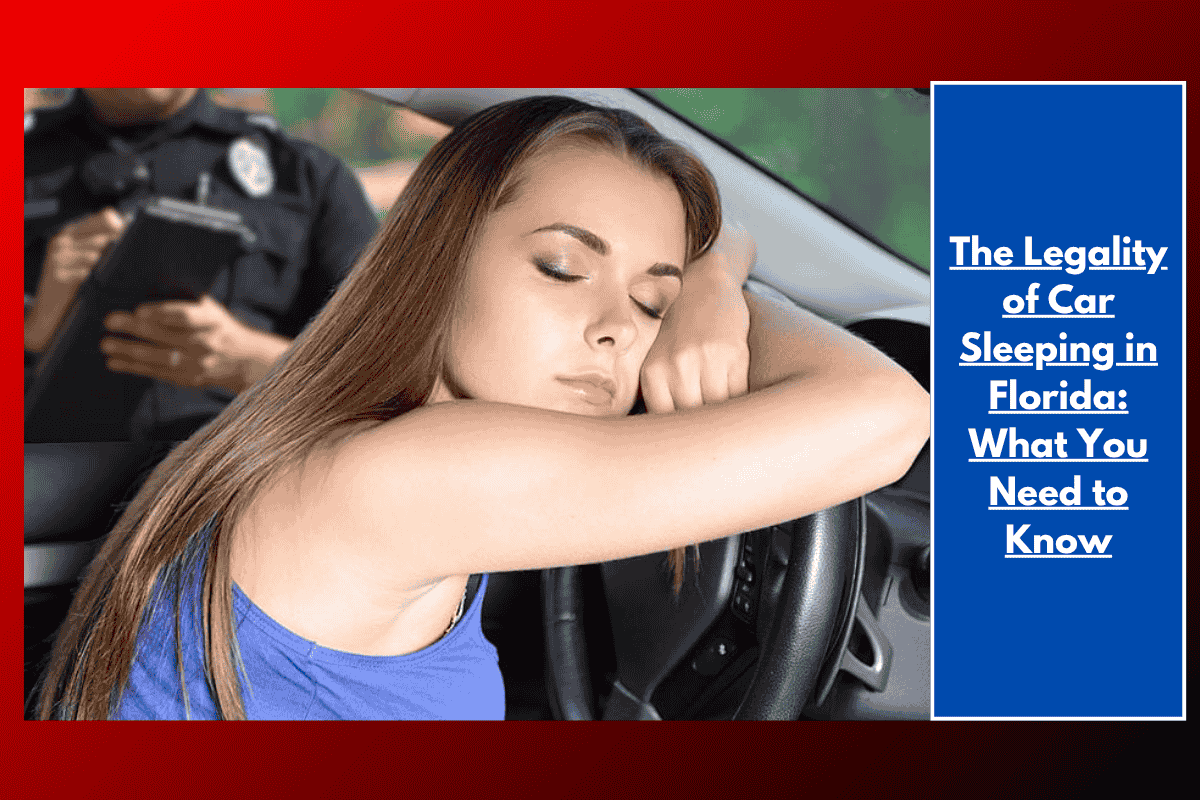Sleeping in your car can be a convenient way to rest during a long road trip or when you’re caught in an emergency situation. However, in Florida, like many other states, there are specific laws and regulations that govern where and when it is legal to sleep in your car. Understanding these laws is crucial to avoid fines or other legal trouble. This guide will break down what you need to know about car sleeping in Florida, including when it’s legal, potential risks, and tips for doing it safely.
Is It Legal to Sleep in Your Car in Florida?
In Florida, sleeping in your car is not inherently illegal, but there are several rules and restrictions to keep in mind. Local laws and city ordinances often determine whether you can sleep in your car legally in a specific area. Here’s a closer look at the factors that come into play:
Public Parking Lots and Streets
In general, sleeping in your car on public streets or parking lots may be prohibited by local ordinances in many Florida cities. For example, some cities have specific rules against overnight parking in certain areas, and these rules could be enforced by parking enforcement officers or police officers. If you’re caught sleeping in your car in a place where it’s not allowed, you could receive a citation or even be towed.
In residential areas, it’s common for cities to prohibit overnight parking on the streets, which may include sleeping in your vehicle. Beach parking lots, especially those near popular tourist destinations or high-traffic areas, often have restrictions on overnight parking to deter illegal camping or other activities.
Rest Areas and Highway Parking
Florida’s rest areas along highways are typically a safer option for sleeping in your car. The Florida Department of Transportation (FDOT) allows drivers to stop and rest at designated rest areas along the highway, and these are often open for short-term parking and relaxation. However, most rest areas have a time limit—usually up to 8 hours—for how long you can stay parked in one spot. This helps avoid illegal camping and ensures that rest areas are available for all drivers who need a break.
While rest areas are generally considered legal places to sleep, they are not always safe or suitable for long-term stays. Always check for posted signs or guidelines that may provide more specific information.
Private Property
If you plan to sleep in your car on private property, you must have the property owner’s permission. Sleeping on private property without authorization can lead to trespassing charges, and you could be asked to leave by the property owner or law enforcement.
Risks of Sleeping in Your Car in Florida
While sleeping in your car might seem convenient, there are a few risks to consider, especially in Florida’s hot and humid climate:
Heat and Safety: Florida’s heat can make sleeping in your car unsafe, particularly during the summer months. Temperatures inside a parked car can quickly rise, leading to heatstroke or heat exhaustion, which can be fatal, especially if you are in an enclosed car with no air circulation. Always ensure your vehicle is properly ventilated, and never sleep in your car if you’re at risk of heat exposure.
Personal Safety: While most places in Florida are safe, sleeping in your car in unfamiliar areas—especially near city streets or in parking lots—can expose you to risks such as theft or assault. Be mindful of your surroundings and try to park in areas where you feel safe. Ideally, sleep in well-lit, populated areas or established rest stops.
Legal Consequences: As mentioned earlier, sleeping in your car in certain areas may be prohibited by local ordinances. If you’re caught sleeping in your car in a location where it’s illegal, you could face fines, a tow, or other penalties. Always check the local laws of the area you’re in before deciding to sleep in your vehicle.
How to Legally Sleep in Your Car in Florida
If you need to sleep in your car while traveling through Florida, here are some tips to help ensure you’re doing so legally and safely:
Use Designated Rest Areas: As mentioned, rest areas along Florida highways are often the best option for short-term car sleeping. Check the posted time limits and follow any specific regulations.
Research Local Laws: Before parking your car overnight in any area, be sure to research the local laws of the city or county you’re in. Some cities may have more lenient laws for sleeping in your car than others.
Consider Campgrounds or RV Parks: If you need a longer stay, consider checking into a campground or RV park. Many campgrounds in Florida allow overnight parking for vehicles and may provide more amenities, such as restrooms and showers, for a small fee.
Always Be Aware of Your Surroundings: Always park in well-lit areas and avoid sleeping in remote, poorly lit, or dangerous locations. Stay aware of any signs or regulations about overnight parking or sleeping in vehicles.
Keep Your Car Well-Ventilated: Florida’s heat can make sleeping in your car uncomfortable, and potentially dangerous. Make sure your windows are slightly cracked for airflow, or use a car fan to help keep the air circulating.
In Florida, sleeping in your car is generally not illegal, but it can be subject to certain restrictions based on local ordinances and the location you choose. Rest areas are typically the safest option for car sleeping, with posted time limits to ensure you’re not overstaying your welcome. Always avoid parking in residential neighborhoods or private property without permission, as this could result in fines or other legal issues.
While it’s not illegal, it’s important to stay mindful of safety concerns, including heat exposure and personal safety. By following local laws and taking necessary precautions, you can safely and legally sleep in your car while traveling through Florida.
SOURCES
[1] https://www.cfpublic.org/housing-homelessness/2025-01-01/florida-law-banning-sleeping-camping-in-public-now-allows-people-to-sue-municipalities
[2] https://thewrangler.com/the-legality-of-car-sleeping-in-florida-what-you-need-to-know/2025/06/14/
[3] https://www.fl-counties.com/publiccamping/
[4] https://dioceseofvaranasi.org.in/illegal-to-sleep-in-your-car-states-where-it-s-not-allowed
[5] https://jerry.ai/state-laws/is-it-illegal-to-sleep-in-your-car-in-florida/














